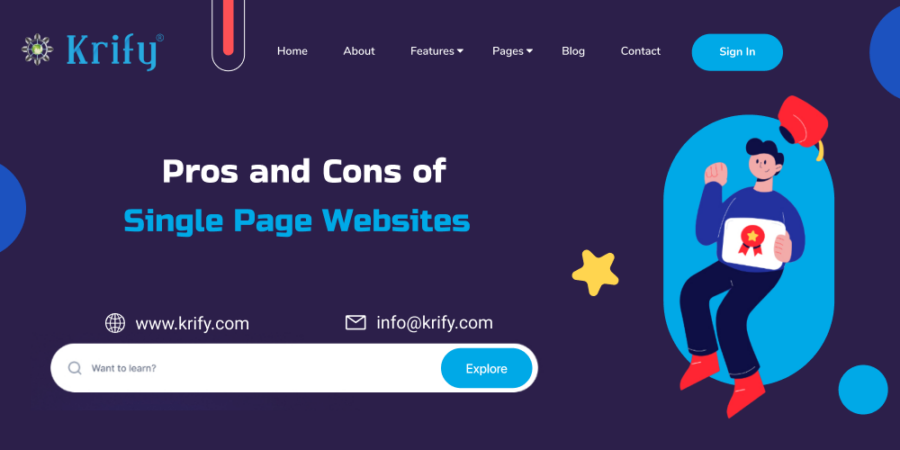Pros and Cons of Single Page Websites
With the ever-growing world of internet, businesses are constantly working on ways to improve user engagement and user experience. Web design is one such area where there is constant innovation and businesses are presented with multiple options to showcase their online presence. In this article, we are going to discuss about one such web design – ‘Single Page Websites’ and discuss in detail the enticing benefits they offer as well as the challenges posed by them.
Technically, a single-page website is a single-page application that dynamically displays content from the server in response to the user interaction. In simple terms, single-page website has only one HTML page. All the key content about the business is presented on a single page to the user. This kind of website does not have additional pages or navigation menu, instead, the users can click on certain links which takes them to the specific content on the same page or can scroll down the page to reach different sections of the content.
Single page websites are minimal in nature and offer a wide variety of advantages as listed below.
Pros of Single Page Websites:
- Simplicity
As the information is presented in a flow, it makes it easier for the users to read and understand about the company/business and their products/offerings. With only one HTML page, the design of a single page website can be very straightforward making it easier to design, build and publish them.
- Mobile Friendly
When navigating websites on mobile, users tend to have better experience when there is only one page to view all the information. Single page websites provide just the same advantage. Users can scroll only on one page to get all the information instead of getting redirected to multiple links/pages.
- Conversion Rate
Generating leads is one of the main objectives of a website. With the simplicity and user-friendly design, single page websites can help in faster and better conversion rates. As all the users go to one-page, high traffic is generated for the website which ultimately results in higher conversion rates.
- User Engagement
Holding the attention of the users is a tricky task and a well-designed single-page website can help in this aspect by keeping the users engaged with a continuous flow of narrative and content.
- Loading Time
Loading speed of a website is a make or break for the users when they visit any website. With the right amount of content and images, single-page websites can be faster to load when compared to other traditional multi-page websites.
While Single Page Websites offer a wide range of benefits, there are also some limitations that cannot be overlooked. Here are some of the disadvantages of single-page websites.
Cons of Single Page Websites:
- Difficulty with SEO
With only one page on this kind of websites, it gets difficult to analyse and understand what content on the site is performing well and what content can be improved as there will not be an option to compare it to any other pages on the website. Also, keyword usage will be heavily limited as saturating the content with many keywords might affect the user experience negatively.
- Limited Scalability
In case additional information needs to be added to this kind of websites, one option is to replace the existing content, which might not always be feasible. Another way is to cram in the new information thereby increasing the length of the page which would result in users scrolling a lot more than usual.
- Sharing Content
A single page website has only one URL which makes sharing specific content on the website a bit more inconvenient than the usual multi-page websites that we see.
- Loading Time
In the above section, loading time has been mentioned as one of the advantages of using single page websites. But this can also be a bane if the features of single page websites are not used properly. For instance, if the page has lots of images, videos or is filled with lot of content, it weighs down the website in the backend thereby increasing the loading speed for the website.
Conclusion
As you can see, there are lot of factors involved in considering a single-page website to represent your company/business. Deciding whether you should opt for single-page website for your business largely depends on what you are offering and how you want to showcase it to your potential customers/users. Understanding who your target audience are and the objectives you have for your online presence are some of the key factors to be looked at.
If you would like to know more about the uses and applications of these kind of websites, we have a team of professionals who can assist you on queries related to single-page websites and help you understand if it fits your business needs. For more information, contact us.


